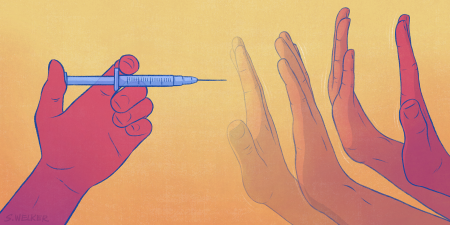Abstract
The 2014 Ebola epidemic in Sierra Leone and the current outbreak that began in 2018 in the Democratic Republic of the Congo generated numerous mental health crises that remain unaddressed by global standard infectious disease protocols. This article explores how responders should integrate mental health care into standard Ebola care.
Case
Dr M, an infectious disease physician, has been treating Ebola patients in the Democratic Republic of the Congo (DRC) for several months. The epidemic has just recently reached a positive turning point: as more treatment units have been opening, more patients have been surviving Ebola virus disease (EVD). However, Dr M has learned that some survivors of EVD are shunned or not allowed to return to their communities when they recover because of fears that they still have Ebola. Also, some EVD survivors experience hallucinations, nightmares, and other symptoms of posttraumatic stress from their Ebola illness experiences. One of Dr M’s patients cries, “You treat us, but we do not have anywhere to go!” She describes recurrent nightmares in which men wearing white personal protective equipment and suits surround her, and she awakes sweaty with palpitations. She states that she feels down, uninterested in activities she used to enjoy. Dr M’s international health organization has not typically deployed psychiatrists, psychologists, or other mental health professionals to help address patients’ Ebola trauma experiences and symptoms.
Commentary
Epidemic response strategies typically involve infection control, health systems strengthening, and other disease containment strategies. However, intense focus on pathogen transmission can lead responders to overlook trauma and psychosocial damage to individuals and communities during and following an epidemic.1 Weak mental health care infrastructure can be exposed by disasters, leaving responders ill equipped to provide appropriate care.1,2,3,4 Untreated, mental illness can lead to long-lasting health consequences and contribute to stigmatization of survivors.1,5,6 Furthermore, some mental health effects can be iatrogenic consequences of treatment or containment protocols, such as isolation, quarantine, or exposure to novel equipment such as personal protective equipment (PPE), particularly biohazard suits.7,8 Following the 2014 Ebola outbreak in West Africa, the prevalence of reported symptoms of mental health disorders was extremely high, with 48% of survey respondents reporting at least one symptom of depression or anxiety in 2015.1
Clinicians volunteering as outbreak responders must anticipate working in health systems unable to provide even minimal mental health care. But without adequate training, clinician volunteers attempting to provide ad hoc mental health care could cause additional harm to a patient.2 This commentary reviews reasons for mistrust of government and psychosocial consequences of EVD and argues that Dr M—and all clinicians treating Ebola patients in the DRC—should be trained to integrate at least basic mental health care into epidemic response practice.
Mistrust and Historical Trauma
The World Health Organization (WHO) response to the 2014 Ebola epidemic in Sierra Leone was widely criticized as lacking timeliness and leadership.3 By 2016, there were over 3900 deaths and 14 100 cases in Sierra Leone, and many individuals had experienced long-lasting psychological symptoms.1 Moreover, the ongoing Ebola outbreak is complicated by ongoing armed conflict in the eastern DRC.9 Violence has hindered containment efforts; many new cases have arisen in conflict zones.10
Culturally appropriate responsiveness to mental illnesses is critical to mitigating local persons’ distrust of international clinicians.
Political instability has exacerbated both mistrust of government and the spread of misinformation. Indeed, a Lancet survey of adults in the DRC found that though the vast majority of respondents believed in the efficacy of vaccines, roughly two-thirds reported that they would not accept the Ebola vaccine, largely due to mistrust of its safety or efficacy.10 Those living in war zones also suffer conditions ranging from physical trauma to depression and posttraumatic stress disorder (PTSD).11,12,13 These mental health conditions, when combined with Ebola and military and paramilitary reinforcement of corporate interests, further undermine trust in public health infrastructure and the capacity to promote good health outcomes and to contain disease.14,15
Responders should consider the clinical and ethical relevance of legacies of violence perpetrated by colonial powers in Ebola-endemic areas. Because countries that were once colonizers of the DRC are perhaps among those now currently aiding Ebola epidemic relief efforts, old legacies of mistrust are exacerbated when international donors distribute nearly all available experimental vaccines to international health care workers rather than local people.16 This history of exploitation and inequity underscores the importance of asking questions about the intentions of international actors and what they stand to gain in the DRC.
Ebola and Psychosocial Context
As in the case, some patients who survive EVD are shunned and thus isolated and stigmatized.5,6 Factors exacerbating stigmatization of EVD survivors in Ebola-endemic areas include political upheaval and cultural beliefs about EVD.5,6,10,17,18,19 Even when EVD patients survive, entrenched stigmatization and mental illnesses arising from treatment suggest the need to build clinicians’ capacity to respond to psychosocial dimensions of EVD and Ebola care.
Iatrogenic effects of EVD and EVD survival also deserve attention from a psychosocial perspective. Due to the high fatality rate of EVD, some clinicians fear patients, which can lead them to minimize physical contact with EVD patients, consequently diminishing the quality of care such patients receive. When patients feel shunned by clinicians, their fear and mistrust can be exacerbated, as demonstrated in the case by the patient who reported nightmares and recurrent fears of men in white PPE Ebola treatment suits. Although the WHO created a Mental Health Gap Action Programme in 2010 for use in low-resource settings,20 this guide does not sufficiently emphasize the importance of culturally appropriate responsiveness, epidemic-specific challenges in global health care delivery, or “upstream” prevention factors that could help decrease the need for mental health services.
Culturally appropriate responsiveness to mental illnesses generated or exacerbated by epidemics such as Ebola is critical to mitigating local persons’ distrust of international clinicians. Dr M, for example, could integrate mental health care into treatment for patients with EVD. Toward this end, Dr M should assess patients’ psychological state and identify key stressors. Rapid mental health diagnostic tests could help clinicians like Dr M identify and assess those patients in need of mental health support.11,17,21 A critical component to diagnosing mental illness is employing questionnaires written and validated using culturally specific terms pertaining to an illness. For instance, words like depression or posttraumatic stress disorder might not be understood or elicit valid responses from patients, so translating mental illness symptoms into appropriate and meaningful language is essential to being able to help patients.
Helping Responders Help Patients
Sensitivity to cultural factors could help responders like Dr M address stigma and help patients cope with stress.19 Accordingly, workshops led by specialists could be offered to help responders implement referral pathways and to make support services available. Treatment for EVD should always include access to follow-up mental health care (therapy and medications) as needed. If mental health service infrastructure is lacking, responders should be paired with mental health caregivers at an Ebola treatment site to meet the full spectrum of patients’ needs. Mobile apps or text messaging can also be helpful when screening for mental illness21,22; enabling wider use of these approaches in international settings could help identify and treat symptoms like those experienced by the patient in the case. Prioritizing EVD patients’ short-term and long-term general health, including mental health outcomes, must be how good Ebola care is defined.
In the ongoing 2018 epidemic, as well as in future Ebola epidemics, international organizations, such as the one for which Dr M works, should seek international and local community support for these priorities. They should also design culturally appropriate educational messages for both Ebola and mental health care and employ responders trained to contain pathogens and psychological trauma.23 To bolster underlying infrastructure for culturally appropriate health service delivery, it is critical to establish and support community-based partnerships with local stakeholders. Community input in stakeholder relationships can subserve better resource allocation and service delivery prioritization.24,25 Being transparent about priorities, seeking international and local community support in implementing them, and training responders are 3 ways to improve Ebola care in the DRC.
Conflict and political violence have exacerbated the 2018 outbreak, and mistrust of responders like Dr M must be taken into account in outbreak responses.10 Both Ebola and political strife contribute to mental illness, including depression, PTSD, and related psychosocial disorders.18 Although Dr M cannot fill gaps in larger infrastructure alone, understanding how mental illnesses are expressed among patients in a specific context can motivate more robust international responses to affected patients and communities.
References
-
Jalloh MF, Li W, Bunnell RE, et al. Impact of Ebola experiences and risk perceptions on mental health in Sierra Leone, July 2015. BMJ Glob Health. 2018;3(2):e000471.
-
O’Leary A, Jalloh MF, Neria Y. Fear and culture: contextualising mental health impact of the 2014-2016 Ebola epidemic in West Africa. BMJ Glob Health. 2018;3(3):e000924.
-
Wenham C. What we have learnt about the World Health Organization from the Ebola outbreak. Philos Trans R Soc Lond B Biol Sci. 2017;372(1721):20160307.
- Bell BP. Overview, control strategies, and lessons learned in the CDC response to the 2014-2016 Ebola epidemic. MMWR Suppl. 2016;65(3):4-11.
- James PB, Wardle J, Steel A, Adams J. Post-Ebola psychosocial experiences and coping mechanisms among Ebola survivors: a systematic review. Trop Med Int Health. 2019;24(6):671-691.
-
Lötsch F, Schnyder J, Goorhuis A, Grobusch MP. Neuropsychological long-term sequelae of Ebola virus disease survivors—a systematic review. Travel Med Infect Dis. 2017;18:18-23.
- Hawryluck L, Gold WL, Robinson S, Pogorski S, Galea S, Styra R. SARS control and psychological effects of quarantine, Toronto, Canada. Emerg Infect Dis. 2004;10(7):1206-1212.
- Johal SS. Psychosocial impacts of quarantine during disease outbreaks and interventions that may help to relieve strain. N Z Med J. 2009;122(1296):47-52.
- Barry A, Ahuka-Mundeke S, Ahmed YA, et al. Outbreak of Ebola virus disease in the Democratic Republic of the Congo, April-May, 2018: an epidemiological study. Lancet. 2018;392(10143):213-221.
- Vinck P, Pham PN, Bindu KK, Bedford J, Nilles EJ. Institutional trust and misinformation in the response to the 2018-19 Ebola outbreak in North Kivu, DR Congo: a population-based survey. Lancet Infect Dis. 2019;19(5):529-536.
- Bayer CP, Klasen F, Adam H. Association of trauma and PTSD symptoms with openness to reconciliation and feelings of revenge among former Ugandan and Congolese child soldiers. JAMA. 2007;298(5):555-559.
-
De Jong J. Trauma, War, and Violence: Public Mental Health in Socio-Cultural Context. New York, NY: Springer Science & Business Media; 2006.
- Mels C, Derluyn I, Broekaert E, Rosseel Y. The psychological impact of forced displacement and related risk factors on Eastern Congolese adolescents affected by war. J Child Psychol Psychiatry. 2010;51(10):1096-1104.
-
Ebola Gbalo Research Group. Responding to the Ebola virus disease outbreak in DR Congo: when will we learn from Sierra Leone? Lancet. 2019;393(10191):2647-2650.
-
Tariq A, Roosa K, Mizumoto K, Chowell G. Assessing reporting delays and the effective reproduction number: the Ebola epidemic in DRC, May 2018-January 2019. Epidemics. 2019;26:128-133.
-
Donovan G. Ebola, epidemics, and ethics—what we have learned. Philos Ethics Humanit Med. 2014;9(1):15.
- Shultz JM, Baingana F, Neria Y. The 2014 Ebola outbreak and mental health: current status and recommended response. JAMA. 2015;313(6):567-568.
-
Hughes P. Mental illness and health in Sierra Leone affected by Ebola: lessons for health workers. Intervention. 2015;13(1):10.
- Hewlett BS, Amola RP. Cultural contexts of Ebola in northern Uganda. Emerg Infect Dis. 2003;9(10):1242-1248.
-
World Health Organization. WHO Mental Health Gap Action Programme (mhGAP). http://www.who.int/mental_health/mhgap/en/. Accessed April 30, 2019.
- Tomita A, Kandolo KM, Susser E, Burns JK. Use of short messaging services to assess depressive symptoms among refugees in South Africa: implications for social services providing mental health care in resource-poor settings. J Telemed Telecare. 2016;22(6):369-377.
- Musyimi CW, Mutiso VN, Haji ZR, Nandoya ES, Ndetei DM. Mobile based mhGAP-IG depression screening in Kenya. Community Ment Health J. 2018;54(1):84-91.
-
Ali GC, Ryan G, Silva MJD. Validated screening tools for common mental disorders in low and middle income countries: a systematic review. PLoS One. 2016;11(6):e0156939.
-
Viswanathan M, Ammerman A, Eng E, et al. Community-based participatory research: assessing the evidence. Evid Rep Technol Assess (Summ). 2004;(99):1-8.
-
Coughlin SS. Community-based participatory research studies on HIV/AIDS prevention, 2005-2014. Jacobs J Community Med. 2016;2(1):019.



